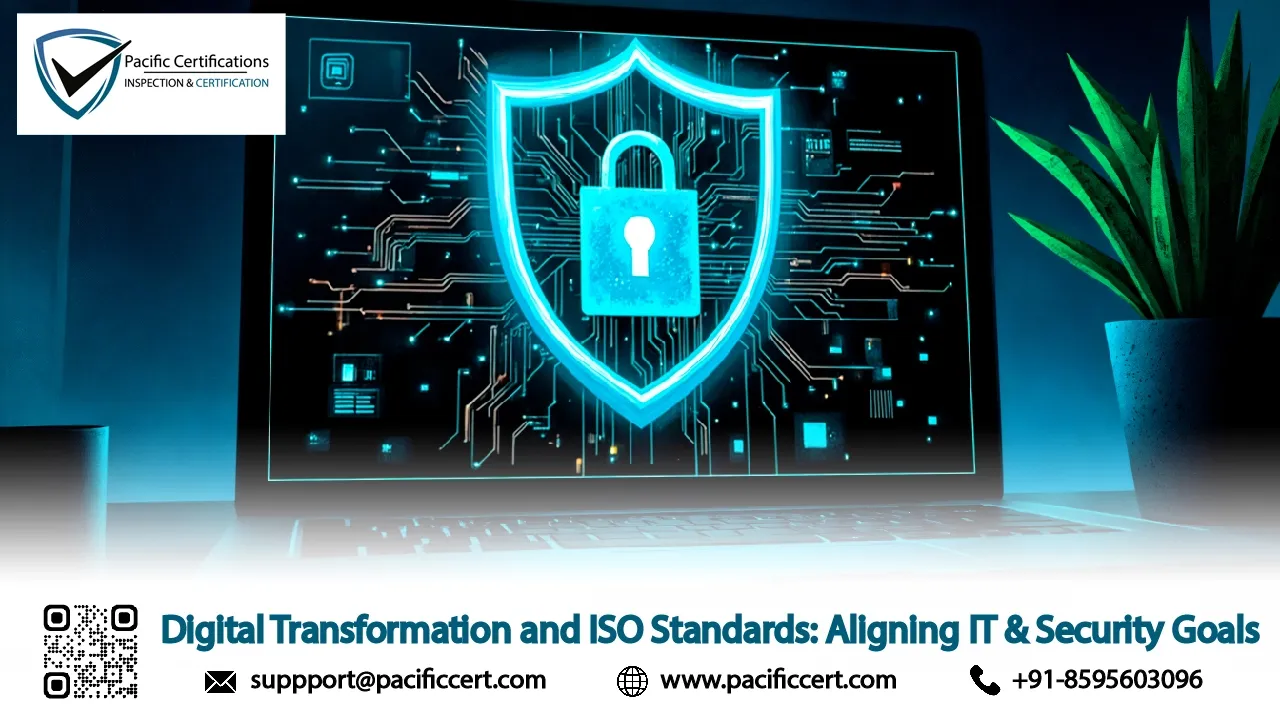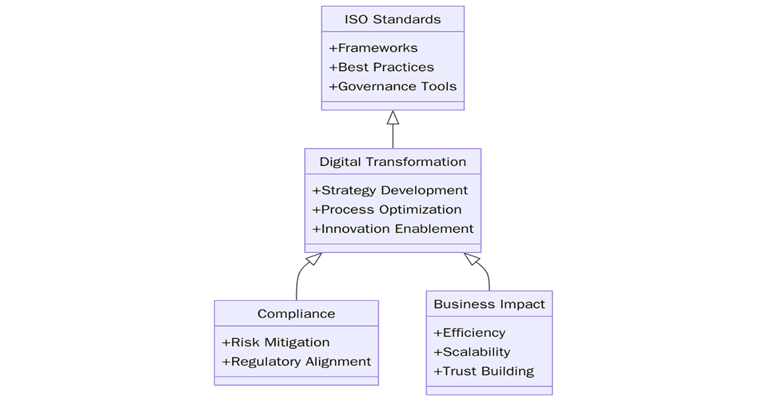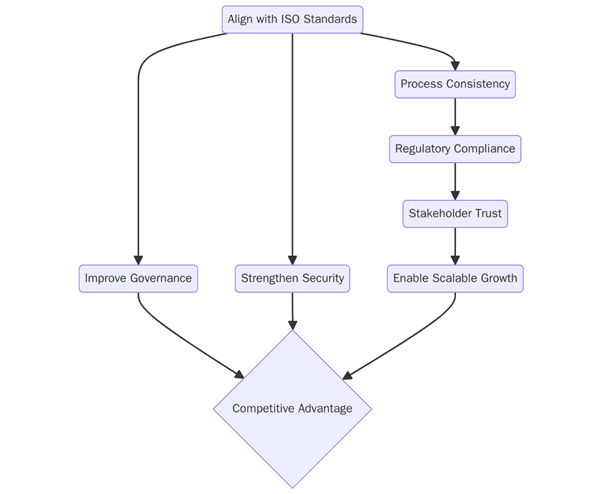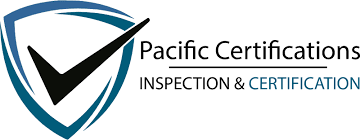Digital Transformation and ISO Standards: Aligning IT & Security Goals

The digital landscape is always changing, and for businesses to remain competitive, they must also change and embrace digital transformation. With our dependence on technology, organizations face new challenges with IT systems management, cybersecurity management, and aligning their goals with ongoing business needs and developments. One of the best ways to manage these complexities is through ISO standards. In this blog, we will look at ISO standards role in digital transformation and how they can assist organizations to align their IT goals and security goals for an improved operational performance as well as safeguard sensitive data.
Introduction
In today's rapidly-accelerating business environment, digital transformation is no longer considered an option; it must now be regarded as important. Businesses are increasingly adopting new technologies to increase productivity, improve customer experience and differentiate themselves from competitors. However, challenges abound in the digital transformation realm, especially with regard to managing IT operations, cybersecurity and making sure core organizational processes fit with business objectives.
ISO standards can provide your business with a structured approach to tackling the challenges with digital transformation. Standards such as ISO/IEC 27001 for information security management, ISO 20000 for IT service management and ISO 22301 for business continuity provide businesses an opportunity to improve their IT systems and security processes.
The Role of ISO Standards in Digital Transformation
As organizations embark on their digital transformation initiatives, the use of ISO standards can help address some of the factors driving the complicated IT and security landscape businesses now occupy. ISO standards provide organizations with clearly defined and actionable methods for organizations to integrate their IT systems, data protection and information security into one system. Here are three critical elements of how ISO standards can support digital transformation:

ISO standards, such as ISO 27001, will assist organizations to identify, estimate and manage risks to information security so that the transition from traditional to digital processes does not introduce excessive risk.
By adopting ISO standards, organizations can guarantee that their digital transformation initiatives are conducted in accordance with international best practice, resulting in predictable, reliable and consistent IT Services.
Many industries operate with stringent regulations governing data protection and cybersecurity. ISO standards such as ISO/IEC 27001 and ISO 9001 will help organizations ensure compliance with regulatory obligations while transitioning to digital systems.
Key ISO Standards for IT and Security in Digital Transformation
There are several ISO standards that play a critical role in helping businesses manage IT systems and security during digital transformation. Some of the most important standards include:

ISO/IEC 27001: Information security management
ISO/IEC 27001 is one of the more recognizable standards for information security management. The standard furnishes enterprises a formalized methodology to protect sensitive information and can improve cyber security overall. The standard assists organizations with the management of security of assets, such as customer data, intellectual property and financial data, that are necessary for digital transformation efforts.
ISO/IEC 27001 also facilitates the identification of future security measures and efforts and establishes controls to mitigate those risks for continuous improvement of information security service practices. This ensures security for IT Infrastructure and sensitive information as an enterprise engages in various digital efforts.
ISO 20000: IT Service Management
As organizational reliance on IT Services affects nearly every area of operations for organizations, ensuring effective delivery and management of services is important. ISO 20000 is a framework to assist organizations with IT Service Management by delivering services that reliably and effectively meet customer requirements, plus regulatory requirements.
As organizations leverage digital transformation, adopting ISO 20000 as a standard for IT Service Management will increase performance, reliability and reliability of IT Services. Organizations require effective management of IT Services to ensure digital transformation is effective, sustainable, resilient and adaptive, otherwise, organizations cannot guarantee digital delivery of services.
ISO 22301: Business Continuity Management
Digital transformation can lead to risks including system downtime, data loss, or interruption to business operations. ISO 22301 presents organizations a framework for business continuity management, so they can ensure that critical business functions can continue during disruption. This standard explains how organizations can prepare for and recover from incidents like cyberattacks, natural disasters and technology failures.
By using ISO 22301, organizations can build in business continuity considerations in the digital transformation strategy, so they can continue or recover critical operations and protect critical data when the unexpected occurs.
Aligning IT and Security Goals in the Digital Transformation Journey
A major barrier to a successful digital transformation is lack of alignment between IT and securities objectives. Transformation relies on commitment to and adoption of new technologies, however, the introduction of new technologies often brings new vulnerabilities and risks to mitigate. Businesses must find the right balance to discover innovation, while also ensuring the protection of important assets and reducing the opportunity for loss or harm. ISO standards help bridge the gap between the objectives of IT & security and business operations.
ISO standards like ISO/IEC 27001 supply businesses with guidance on how organizations can better implement a proactive risk management process to quickly identify and treat security risk vulnerabilities when digital transformation occurs. The effort spent implementing ISO standards also helps to foster collaboration and cooperative environment between IT and security teams to help ensure that any security controls, practices and/or protocols are incorporated into the design and implementation phases of new technologies
The Benefits of Aligning Digital Transformation with ISO Standards
Aligning digital transformation efforts with ISO standards offers several key benefits:

By implementing ISO standards (such as ISO/IEC 27001), organizations can provide additional assurance that their IT systems security and protection of sensitive information is in place against direct cyber threats.
ISO standards such as ISO 20000 help organizations improve the efficiency in IT service management processes, ensuring project delivery on-time and on-budget while ensuring a reduction in down-time during their digital transformation phases.
ISO standards provide organizations with compliance frameworks to industry specific regulations and global protections to data laws, thereby ensuring companies are more in compliance in their digital transformation efforts.
ISO certification provides assurance to organizations that they identify security, quality and end-user value which assists companies in fostering trust among customer, investors and regulators.
Contact Us
Pacific Certifications is here to guide your organization through the ISO certification process. Whether you’re looking to improve IT management, improve cybersecurity, or ensure compliance during digital transformation, our team of experts is ready to assist you every step of the way.
For assistance, contact us at [email protected].
Visit our website at www.pacificcert.com.
Contact Us
If you need support with ISO certification in Digital Transformation, contact us at [email protected].
Read More at: Blogs by Pacific Certifications

